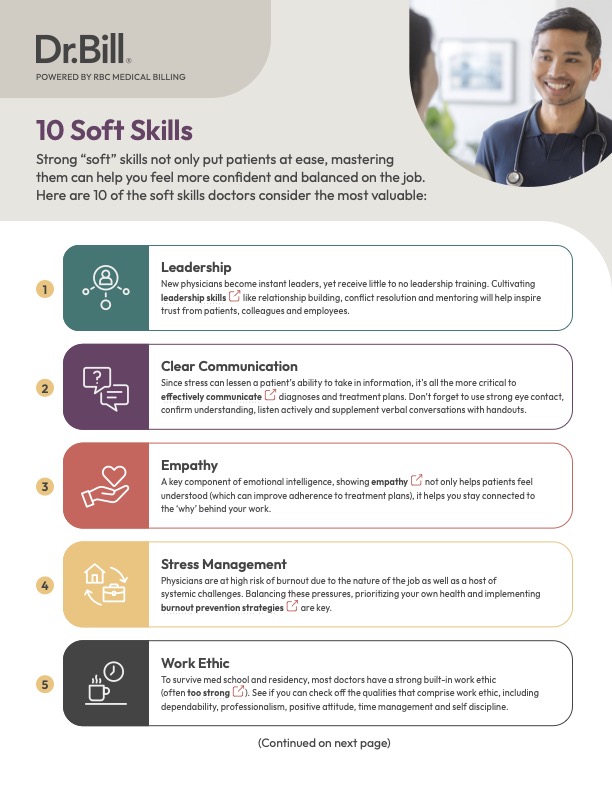Are you a medical student pursuing a residency in Canada? If so, you'll need to make an up-to-date resume that successfully highlights your capabilities as a physician and your commitment to health care.
Below are 9 steps for writing an attention-grabbing medical resume that'll impress residency selection committees and boost your chances of earning an interview with them.
1. Collect information related to your medical resume as early as possible
The residency application process is competitive and requires extensive preparation, so give yourself a headstart by researching the criteria well in advance (for example, a year early) before writing your medical student CV (curriculum vitae).
Learning what residency programs expect of their applicants early on will save you time and make the CV writing process less overwhelming as you’re putting everything together.
Begin by researching the Canadian Resident Matching Service (CaRMS) website to find out when CaRMS is ready to accept applications from your university. Make a checklist of the items you’ll need to prepare once you understand how CaRMS works.
Additionally, watch informative YouTube videos, speak with academic coaches who understand the residency application process, and look at examples of medical student CVs to familiarize yourself with a medical CV’s structure and criteria.
2. Decide what resume sections you’ll include
Because every medical student’s resume contains different information, decide what CV sections are relevant to you, along with the achievements and experiences that’ll make you stand out on your residency application.
For example, if you were an avid volunteer during medical school, consider making a dedicated section for your volunteering experience.
Or if you speak other foreign languages, create a “Languages” section to show residency program directors your ability to communicate with a wider range of patients.
Additionally, planning out the sections of your medical CV helps to:
- Determine what letters of recommendation you’ll need and who your referees will be (for instance, your clinical supervisor, work colleague, or university professor)
- Provide ideas about what to write in your personal statement letter (also known as a cover letter)
- Remind yourself of your academic accomplishments, skills, experiences, and interests related to medicine that’ll get residency program directors to notice you
To give you an idea of what CV sections you may want to add, here’s an overview of the sections that residency selection committees typically seek in a medical CV:
- Contact information
- Education and academic credentials
- Research and clinical experience
- Work experience
- Volunteer experience
- Teaching experience
- Internships
- Awards, project grants, and scholarships
- Professional associations
- Publications and presentations
- Relevant skills
- Hobbies and personal interests
3. Arrange your CV sections in order of importance
Although your education section should come after your contact details, you can organize your other CV sections according to what your target residency programs look for in their candidates. You can submit custom CVs to CaRMS, so arrange your CV differently based on the type of residency program you’re applying to.
These are some questions to ask yourself while laying out your CV sections:
- What medical specialties will you pursue?
- What are specific keywords that your target programs are looking for?
- What abilities have you developed (for example, previous research, teaching, community clinical experience, work, volunteer, and extracurricular activities) that are helpful for the programs you’re applying for?
- Have you trained, supervised, or mentored others?
- What are your biggest strengths and accomplishments? Does your program value a certain approach or experience? (For instance, your tumour biology clinical research might come in handy if you’re applying to a medical oncology program)
4. Format your medical CV correctly
Carefully formatting your medical CV’s information and layout shows residency program directors you’re an organized and detail-oriented candidate.
Although there’s no set limit to the number of pages your medical CV should be, it should still be concise and easy to read. Because you aren’t expected to have a ton of work experience yet, aim for 3–5 pages and include your most valuable academic and professional qualifications that present you as a medical specialist.
Here are several tips to help you structure your medical student CV properly:
- Use a reverse-chronological format. This format shows your most relevant or recent experiences first and allows residency program directors to view your application in a logical order.
- Print your medical CV on 21.59 x 27.94 cm (8½ by 11-inch) letter size paper in a standard white colour and keep it consistent with your other residency application documents.
- Prepare 2.5 cm (1-inch) margins on all sides of your medical CV so there’s enough white spacing throughout and your statements are neat and readable.
- Choose a standard font such as Times New Roman, Arial, or Verdana. Avoid using loud colors because they might distract readers from the actual contents of your medical CV.
- Make your CV’s section headers size 13 or 14 points so they’re easily noticeable. Then, use a font size of 10–12 points for the rest of your statements so your medical CV doesn’t look too crowded or empty.
5. Place your contact details at the top of your medical CV
Your contact information is the first category that residency selection committees see as they read your medical CV, so ensure your details are accurate and up-to-date.
At the top of your medical CV, include your:
- Full name
- Phone number
- Address (street, city, province, postal code)
- Email address (list your academic email address if you use it regularly)
- LinkedIn profile (if you have one)
Have a look below at this example of an applicant’s contact details:
Randall Lee
2568 Arbutus St, Vancouver, BC V6J 3Y2
604-352-7195
your-email@test.com
www.linkedin.com/in/your-name-here
And to present your best professional self online, don’t forget to review your current social media platforms and adjust your privacy settings before applying for any residency programs.
6. List your education details prominently
Including your education in reverse chronological order (starting with your current school) lets residency selection committees immediately determine whether you meet their academic criteria.
Your education section should sit underneath your contact details and list the:
- Name of your current institution and city location
- Name of your degree
- Date you’ll finish medical school (or your expected completion date)
Also, add your undergraduate or graduate education to give residency program directors more context about your previous schooling and background.
Here’s an example of what a medical CV’s education section looks like:
Education
- 2018–2023 (Expected)
- Doctor of Medicine
- The University of British Columbia, Vancouver, BC
- 2014–2018
- Bachelor of Science with Distinction in Life Sciences
- Queen’s University, Kingston, ON
7. Highlight your accomplishments using bullet points and details
Huge blocks of text are challenging to read. Instead, use bulleted lists throughout your medical CV to highlight important points and make your medical CV more scannable.
Give your bullet points as much context as possible by quantifying your medical CV with numbers (like percentages, number of patients, or statistics) and providing specific details. For instance, rather than just naming a scholarship you received, also add what it was for, and how competitive it was.
And don’t forget to include the following components for your awards and honours:
- Date of the award
- Granting organization
- Purpose
Take a look at an example of a residency applicant’s scholarship details below:
John D. Schultz Scholarship Recipient, 2019
Ontario Heart and Stroke Foundation
- $4,500 scholarship awarded to 20 participants in Ontario
- Based on excellent academic performance and research potential in cardiology and heart rate analysis
8. Include your relevant experience on your medical CV
Your other CV sections should focus on your medical-related experience or research methods. Below are some tips for writing these categories:
Work, leadership, and clinical experience
Use medically related experiences that showcase your leadership skills and value to an organization.
Here are relevant details to include in your work, leadership, and clinical experience sections:
- Job title
- Hospital or employer name
- Dates of employment (month and year) for each experience
- Specialty or subspecialty
- Name of supervisor
- Relevant electives
- Purpose of your experience and specific insights you gained
Publications and presentations
List your papers by their title, place, and date you published or presented them. If you have several presentations, consider placing them in subcategories like “International,” “National,” and “Provincial.”
Professional memberships and associations
Add any professional organizations to this category, your leadership title (if applicable), and how long you’ve had a membership with them.
Volunteer experience
Choose organizations that are directly related to the medical field. Include the position title, name of the organization, hours or dates you dedicated your time, and a short description of your role as a volunteer.
Research and teaching experience
Include your funded research projects, project topics you’ve written, and formal training or courses you’ve taken or taught.
Relevant skills
Adding a skills section is a good way to demonstrate your capabilities as a future physician.
Hard skills like analyzing patient data, pharmaceutical drug knowledge, and using health databases convey what you’ve learned during school and training.
On the other hand, soft skills for doctors (like time management or working under pressure) tell residency selection committees exactly how you’d work with patients and colleagues.
Hobbies and interests
This section can generate potential interview discussion points and illustrate your personality and character outside of a work setting.
But be mindful of what interests you list. Focus on including enriching activities that bring value to your skills as a physician and link back to your medical specialty, such as ones involving:
- Teamwork
- Culture
- Community involvement
- Health and fitness
- Student clubs or groups
9. Spend time proofreading your medical CV
Finally, remember to look over your CV carefully to ensure there are no errors, outdated information, or grammatical mistakes. Try reading your CV’s contents out loud and observe if your statements seem clear and succinct.
Asking someone you trust to proofread your medical CV for you or enlisting an academic advisor’s help will also go a long way in ensuring your residency application is as effective as can be.
Overall, by taking the time to create a well-written and polished medical CV, you’ll increase your chances of being selected for a residency interview and entering the workforce.
Good luck with your medical journey!

10 Soft Skills Every Physician Needs
Soft skills for doctors are an essential part of the job. Unlike almost every other career, at the core of the medical profession is someone’s well being.
Download the checklist to learn the 10 soft skills every physician needs.







